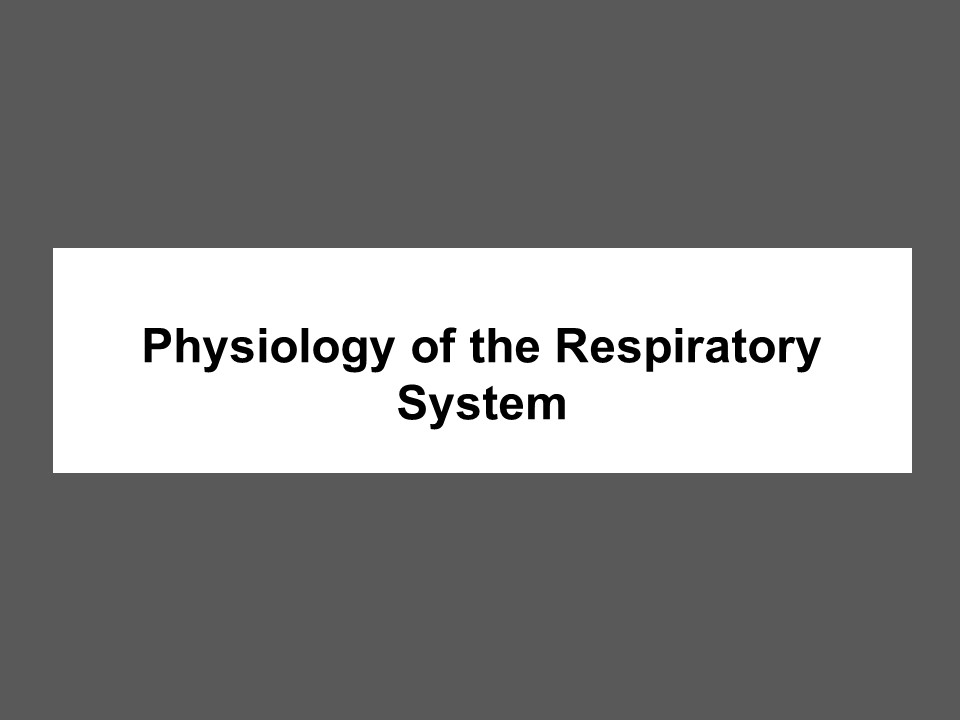Physiology of the Respiratory System | Jindal chest clinic
Title:
Physiology of the Respiratory System | Jindal chest clinic
Description:
Respiratory system is the system in which the organs and structures in body that allow to breathe. This presentation gives an overview on "Physiology of the Respiratory System" including: non respiratory functions, air conditioning, warming and humidfying, immune functions, functions of cilia, metabolic functions, etc. For more information please contact us: 9779030507. –
Number of Views:1
Title: Physiology of the Respiratory System | Jindal chest clinic
1
Physiology of the Respiratory System
2
Physiology of the Respiratory System
- Structure of the Respiratory System
- Mechanical Properties in Respiration
- Pulmonary Circulation, Ventilation/Perfusion
Ratio - Diffusion and Transport of Respiratory Gases
- Control of Respiration
- Nonrespiratory Functions of the Respiratory
System
3
Nonrespiratory Functions
- Air conditioning
- Immune functions
- Metabolic functions
- Other functions
4
Air Conditioning
- Warming
- Humidifying
- Clearing
5
Warming and Humidifying
By the lobar bronchi 37ºC and fully
moist Nasal cavity! 250 ml/day loss
6
Clearing - Mucociliar Cleareance
- 5-10 µm gel, not
- continuous
- islands of mucus
- 5-6 µm periciliary
- fluid
- cilia
- goblet cells, glands,
- Clara-cells
7
Cystic Fibrosis
- cystic fibrosis transmembrane conductance
regulator (CFTR), impaired function of this
cyclic AMP regulated Cl-ion channel - Autosomal recessive, 13000 (caucasian)
8
Cilia
250 cilia/cell 2-5 µm length Only the tip
reaches the gel 1000 strokes/min
9
The Airway Cleaning Function of Cilia
Trachea, main bronchi 5-20 µm/min Bronchioli
0,5-1 µm/min
10
Clearing as a Function of Particle Size
gt 10µm nasal cavity, nasal hair 2 -
10µm lower airways, trachea, bronchi,
turbulent flow! 0,2 - 2µm
bronchioli lt 0,2µm reaches the
alveoli ? macrophages
11
Immune Functions
- Special immune system is
- necessary
- Mucosa Associated Lympoid Tissue (MALT)
- Bronchus Associated Lympoid Tissue (BALT)
- B-lymphocytes ? IgA
- NK cells, macrophages
12
Asthma
IgE, mast cells
13
Metabolic Functions
- Renin angiotensin system
- Angiotensin converting enzyme (ACE) is located
mainly on the surface of - endothelial cells in the lung A I. ?
A II. - Metabolism of biologically active substances
- serotonin, noradrenalin, prostaglandin
- Production of factors influencing blood
coagulation - source of plasminogen activator,
thromboplastin production, - heparin production
14
Other Functions
- Filter function
- Elimination of volatile substances
- Smelling
- Vocalization
- Body posture stability
- Sighing, yawning
15
Filter Function
Lung functions as a filter for substances from
the venous side of circulation -
Embolus - Tumour-metastasis
16
Elimination of Volatile Substances
Certain volatile substances diffuse into the
alveoli from the blood and can be detected and
smelt in the expired air - acetone
? diabetes -
methyl-mercaptan ? liver disease -
ethyl-alcohol ? high blood level
17
Smelling and Vocalization
Behavioral control!!
18
Body Posture Stability, Sighing, Yawning
Stability Valsalva-maneuver Sighing
increasing superficial surfactant
concentration (?) Yawning
?
19
Cardiorespiratory Adaptation during Exercise,
Primary Prevention
20
Processes Involved in O2 Consumption
21
Reserves in the Cardiorespiratory System
22
Respiratory Changes during Exercise
- Ventilation/perfusion ratios become more equal
- Reserves are used more and more
23
Respiratory Changes during Exercise
Anaerobic threshold
24
Determination of Anaerobic Threshold
25
Circulatory Changes during Exercise
Postexercise hypotension
26
Blood Flow in Coronary Arteries
HR x SBP double product
27
Redistribution
Sympathetic outflow Epinephrin, norepinephrin
a1 IP3/DAG vasoconstriction ß2 cAMP
vasodilation
28
Distribution of Cardiac Output (ml/min) in
Resting State and during Various Levels of
Exercise
Exercise Intensity
Organ
Resting Mild
Intermediate Maximal
Splanchnic
Kidney
Brain
Heart
Muscles
Skin
Other
Total
29
Oxygen Consumption
30
Changes in Cardiorespiratory Parameters during
Exercise
31
Primary Prevention
Preventing the occurence of diseases.
- Hand washing, immunization
H1N1 - Natures editorial
- A tsunami is coming. No one knows how
big it will be. Prepare to go for higher
ground. - Health promotion
32
Effects of Smoking
- Decreased alveolar surface
- Increased FRC, decreased IRV
- Decreased mucociliar clearance
- Increased airway resistance
- Decreased O2-transport due to CO-Hb
- Tumours due to carcinogens
- Decreased physical capabilities
- Increased atherosclerosis ? AMI
- Acute
Myocardial Infarct
33
The Smoking Epidemic
34
Percentage of Female Smokers in the EU
35
Percentage of Male Smokers in the EU
36
Percentage of Smokers in the EU
37
Acute Myocardial Infarct Related Deaths
38
Theory and Advice
Fight-or-flight response W.
Cannon Originally Stress ? Muscle
work, exercise Current fight answers
angry, argumentative beaviour Current flight
answers social withdrawal, substance
abuse ?
smoking
Friedman, H. S., Silver, R. C. (2007).
Foundations of Health Psychology. New York
Oxford University Press.
39
Thank You































